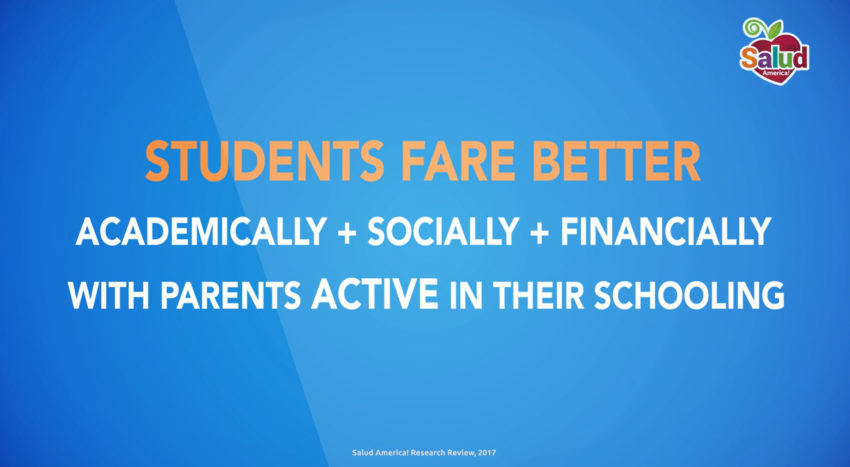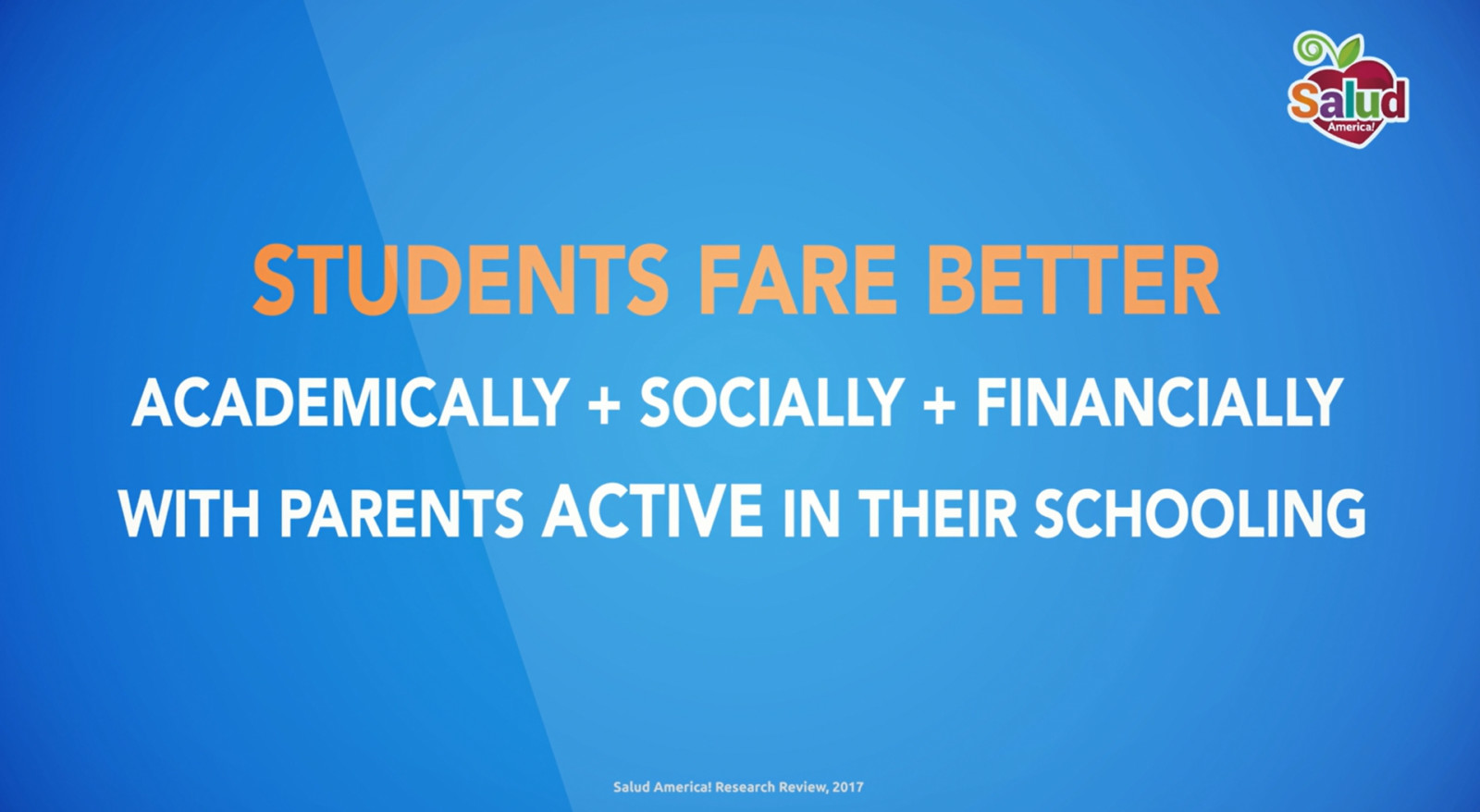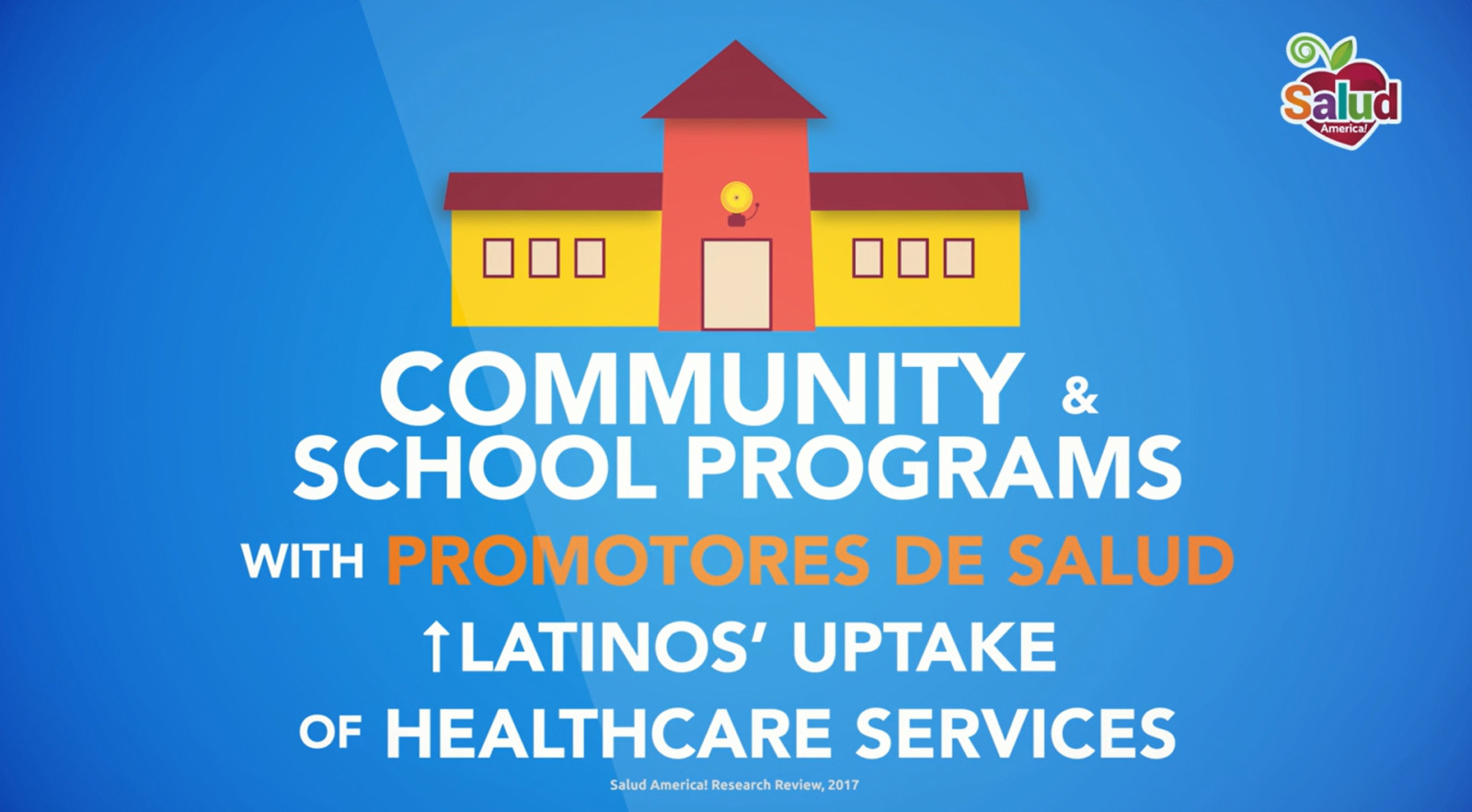
Share On Social!
This is part of our Building Support for Latino Families: A Research Review »
Kids Do Better with Parents Active in Their Education
 Whether we are discussing infant care, preschool, grade school, or high school in the United States, students whose parents are actively engaged in their education fare better academically, socially, and economically.62–67
Whether we are discussing infant care, preschool, grade school, or high school in the United States, students whose parents are actively engaged in their education fare better academically, socially, and economically.62–67
Active parent participation and interest in a child’s education promotes internalization of specific social and academic goals, and makes education a priority for the student and for the family.
In fact, parental engagement has been used to explain some of the heterogeneity in educational outcomes for children from low-income Latino communities, such that greater parental involvement results in better academic and behavioral outcomes.68
Furthermore, the effects of early (preschool) parental involvement are long-lasting, leading to continued positive outcomes through high school and into early adulthood.66 School engagement consists of reinforcing education at home (reading to children, helping with homework, providing supplemental materials) as well as active school participation (volunteering in classroom and school events, parent-teacher communication).
Low-Income Latino Parents Are Less Involved in Their Children’s Education
Low-income Latino parents have historically scored lower on both measures of engagement than their low-income peers.69,70
Though there are surely culture-specific ways that Latino parents support their children’s education,71 for the measures that are valued within the United States school system, Latino parents fall behind.
 While low socioeconomic status makes school engagement more difficult due to work schedules, social discomfort, and educational attainment, engagement may also be influenced by acculturation, which in this case relates to Latino parents’ familiarity with mainstream expectations of parental involvement in the United States.14,72
While low socioeconomic status makes school engagement more difficult due to work schedules, social discomfort, and educational attainment, engagement may also be influenced by acculturation, which in this case relates to Latino parents’ familiarity with mainstream expectations of parental involvement in the United States.14,72
Particular to Latino cultures is the concept of educación, which holds parents responsible for moral education, while the school is responsible for academic education; in this worldview, too much parental meddling in the school environment would disrespect the school’s authority.14,72 This particular concept of parental responsibility does not allow the parent to be an advocate for their child within the school community, a role which is often necessary and valued in the American school system.73
Further barriers to school engagement include linguistic and social discomfort, as demonstrated by evidence that bilingual and more formally educated Latino parents demonstrate higher rates of school involvement.16 More generally, Latino parents report less welcoming experiences at their child’s school than their non-Latino counterparts.74
Finding linguistically and culturally sensitive methods to engage Latino parents in their child’s education should be a priority for policymakers.
Training Can Help Parents Engage in Education
A study of the effects of Latino parental involvement in the preschool years was conducted in the Chicago Parent Program (CPP) study.33
This study analyzed the effects of involving low-income, urban parents of 2-4-year-olds in 12 childcare center-run “parent training” sessions featuring the concept of child-centered time; the importance of family routines and traditions; the value of praise and encouragement; the role of rewards for reducing challenging behavior; the importance of setting clear limits and of following through on limit setting; the need to establish consequences in response to misbehavior parents want stopped; and the use of specific parenting strategies such as ignore, distract, and time out; stress management; and problem-solving skills.
These parent training sessions were uniquely developed in collaboration with constituent African American and Latino parents, making them culturally and contextually relevant to the populations they served.
Parents who participated in at least 50% of sessions reported “greater improvements in parenting self-efficacy, more consistent discipline, greater warmth, and a decline in child behavior problems when compared to reports from controls,” the authors wrote.
Thus, the authors concluded that parental involvement in their child’s education at an early age could reduce future behavioral risk among children from low-income families.33
Furthermore, parents who see positive changes in their child’s behavior and academic achievement at a young age are more likely to remain active participants in their child’s academic career, compounding the effects of early involvement.62–68
How to Further Increase Parental Involvement in Education
Policymakers interested in increasing Latino parent involvement in student academics can consider two types of programs: those that operate within schools, and those that operate outside of schools.
 The first option can include incorporating dual-language parent “navigators” or “promotoras de salud” (bilingual, bicultural community health advocates who support or directly link individuals to healthcare providers, services, or resources) at schools to help immigrant or Spanish-speaking parents feel more comfortable attending events or accessing resources on-site.
The first option can include incorporating dual-language parent “navigators” or “promotoras de salud” (bilingual, bicultural community health advocates who support or directly link individuals to healthcare providers, services, or resources) at schools to help immigrant or Spanish-speaking parents feel more comfortable attending events or accessing resources on-site.
Out-of school programs may involve organizing home visits so that students’ parents are provided information in their preferred language, without the need to attend school events.14
In both cases, helping Latino parents gain an understanding of the resources available to their child and to the whole family can improve the wellbeing of the entire Latino community.
Some examples of programs that are successfully bridging the gap between school and home, as well as community, in Latino neighborhoods include:
Abriendo Puertas: Nonexperimental; Provides information about preschool and school choice, as well as financial literacy activities, such discussion of tax code and earned income tax credit.75
AVANCE: Randomized and controlled; educates parent at home and on site to help with childcare, information on contraception and family planning, and continuing education courses.76
Lee y Seras: A Latino-targeted literacy outreach campaign to inform, engage and help prepare families and communities to support the reading development of Latino children. Runs for 2-6 months.77
HIPPY (Home Instruction for Parents of Preschool Youngsters): Conducts home visits and support group meetings for three years to promote knowledge of child development, teaching behavior, and home literacy.78
PEEP (Peer Engagement Education Program): Runs for 2-6 months, financial literacy activities including discussion of tax code and earned income tax credit, workshops for parents and teachers on engaging parents in child’s education.79
Project FLAME: Parent workshops to help parents serve as literacy models, education on how to connect to schools and use community services; brings in representatives of community institutions (e.g. banks, hospitals) to explain services, also emphasizes role of parent as teacher.80
Overall, these programs vary in their duration and emphasis, but they all share the common theme of focusing on parents who are “often socioeconomically and/or linguistically marginalized or isolated and trying to empower them as the managers of their children’s lives and education.”14
As mentioned above, this may be especially useful in the Latino community, where the cultural concept of educación may make parents hesitant to intervene in academics.
It is also important to note that aside from focusing exclusively on the child, these programs place significant attention on the needs of the parent. As discussed in other sections of this research review, two-generation programs that address the needs of parents as intensively as the needs of children are most effective for whole-family wellbeing.
More from our Building Support for Latino Families: A Research Review »
- Introduction & Methods
- Key Research Finding: Latinos’ Big Healthcare Gaps
- Key Research Finding: Early Cognitive Development
- Key Research Finding: ECE Programs
- Key Research Finding: Disconnected Latino Parents (this section)
- Key Research Finding: Head Start Centers as Resource Hubs
- Key Research Finding: Promotores de Salud
- Key Research Finding: Latino Medical Homes
- Key Research Finding: Latino Community Schools
- Policy Implications
- Future Research Needs
References for this section »
14. Crosnoe, R. Two-Generation Strategies and Involving Immigrant Parents in Children’s Education. Urban Inst. NJ1 (2010).
16. McWayne, C. M. & Melzi, G. Validation of a culture-contextualized measure of family engagement in the early learning of low-income Latino children. J. Fam. Psychol. 28, 260–266 (2014).
33. Gross, D. et al. Efficacy of the Chicago Parent Program with Low-Income African American and Latino Parents of Young Children. Prev. Sci. 10, 54–65 (2009).
62. Jeynes, W. H. A Meta-Analysis: The Effects of Parental Involvement on Minority Children’s Academic Achievement. Educ. Urban Soc. 35, 202–218 (2003).
63. Jeynes, W. H. A Meta-Analysis of the Relation of Parental Involvement to Urban Elementary School Student Academic Achievement. Urban Educ. 40, 237–269 (2005).
64. Jeynes, W. H. The Relationship Between Parental Involvement and Urban Secondary School Student Academic Achievement: A Meta-Analysis. Urban Educ. 42, 82–110 (2007).
65. Wong, S. W. & Hughes, J. N. Ethnicity and Language Contributions to Dimensions of Parent Involvement. Sch. Psychol. Rev. 35, 645–662 (2006).
66. Barnard, W. M. Parent involvement in elementary school and educational attainment. Child. Youth Serv. Rev. 26, 39–62 (2004).
67. Rimm-Kaufman, S. E., Pianta, R. C., Cox, M. J. & Bradley, R. H. Teacher-Rated Family Involvement and Children’s Social and Academic Outcomes in Kindergarten. Early Educ. Dev. 14, 179–198 (2003).
68. Gandara, P. C. & Contreras, F. The Latino Education Crisis: The Consequences of Failed Social Policies. (Harvard University Press, 2009).
69. Cooper, C. E., Crosnoe, R., Suizzo, M.-A. & Pituch, K. A. Poverty, Race, and Parental Involvement During the Transition to Elementary School. J. Fam. Issues 31, 859–883 (2010).
70. Farver, J. A. M., Xu, Y., Eppe, S. & Lonigan, C. J. Home environments and young Latino children’s school readiness. Early Child. Res. Q. 21, 196–212 (2006).
71. McWayne, C., Campos, R. & Owsianik, M. A multidimensional, multilevel examination of mother and father involvement among culturally diverse Head Start families. J. Sch. Psychol. 46, 551–573 (2008).
72. Hill, N. E. & Taylor, L. C. Parental School Involvement and Children’s Academic Achievement: Pragmatics and Issues. Curr. Dir. Psychol. Sci. 13, 161–164 (2004).
73. Lareau, A. Unequal Childhoods: Class, Race, and Family Life. (University of California Press, 2003).
74. Martinez, C. R., DeGarmo, D. S. & Eddy, J. M. Promoting Academic Success Among Latino Youth. Hisp. J. Behav. Sci. 26, 128–151 (2004).
75. Abriendo Puertas ⎟ Opening Doors : apod.org. Available at: http://ap-od.org/. (Accessed: 29th September 2017)
76. AVANCE. Available at: http://www.avance.org/. (Accessed: 29th September 2017)
77. Lee y serás | Sunshine Avenue.
78. Home | HIPPY USA. Available at: https://www.hippyusa.org/. (Accessed: 29th September 2017)
79. Evangelou, M., Brooks, G. & Smith, S. The Birth to School Study: Evidence on the Effectiveness of PEEP, an Early Intervention for Children at Risk of Educational Under-Achievement. Oxf. Rev. Educ. 33, 581–609 (2007).
80. Shanahan, T., Mulhern, M. & Rodriguez-Brown, F. Project FLAME: Lessons Learned from a Family Literacy Program for Linguistic Minority Families. Read. Teach. 48, 586–593 (1995).
Explore More:
Healthy Families & SchoolsBy The Numbers
142
Percent
Expected rise in Latino cancer cases in coming years



